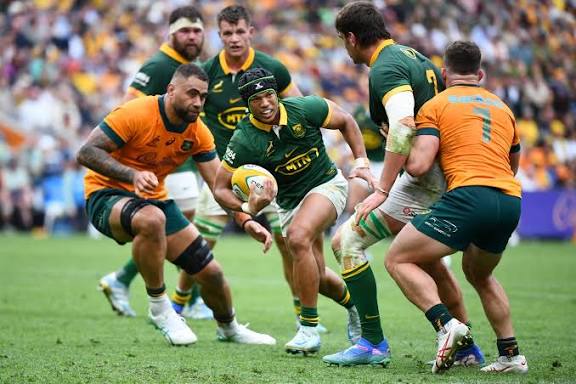Skip to content
Springboks team focusing on five takeaways about Rassie Erasmus’s role and the team’s direction toward evolution rather than revolution.

Springboks Team: Five Takeaways as ‘Maverick’ Rassie Erasmus ‘Raises Eyebrows’ but South Africa Looks for ‘Evolution Rather than Revolution’
South African rugby fans and analysts are closely watching the Springboks under the stewardship of Rassie Erasmus, a coach known for his unconventional approach and outspoken nature.
While his style has often been described as maverick, recent team selections and strategies reveal a calculated attempt to evolve the Springboks rather than overhaul them completely.
Here are five key takeaways from the latest developments surrounding the Springboks and Rassie Erasmus’s vision.

1. Rassie Erasmus: The Maverick with a Method
Erasmus has built a reputation as a rugby mastermind who isn’t afraid to shake things up.
His direct communication style and strategic risks have earned both praise and criticism.
The term “maverick” often comes up when discussing him because of his willingness to challenge norms and make bold calls.
However, this recent phase of his coaching appears less about radical change and more about subtle adjustments.

Fans might have expected a complete team overhaul following the Springboks’ mixed performances over the last year.
Instead, Erasmus is carefully blending fresh talent with experienced stalwarts, signaling a focus on evolutionary growth.
This approach shows his confidence in the existing team core, trusting that minor tweaks will build a stronger, more adaptive squad.
2. Balancing Experience and Youth
One of the standout features of Erasmus’s recent team selections is his balanced mix of seasoned players and promising newcomers.
The Springboks have several veterans who bring invaluable leadership and composure under pressure.

At the same time, Erasmus is integrating younger players who offer energy, agility, and fresh perspectives on the field.
This dual approach helps the Springboks maintain continuity while injecting new life into the squad.
It also reduces the risk of instability that often accompanies wholesale changes.
By fostering a culture where young talent is nurtured alongside seasoned pros, Erasmus is setting the stage for sustainable success in the medium to long term.
3. Strategic, Not Radical, Adjustments in Playing Style
Erasmus’s coaching style has always emphasized physicality, tactical discipline, and mental toughness — hallmarks of Springbok rugby.
However, recent matches suggest a subtle evolution in tactics rather than a complete tactical revolution.
There is a growing emphasis on dynamic ball movement and increased attacking flair without compromising defensive solidity.
The Springboks are experimenting with more flexible formations and encouraging players to read the game instinctively.
This approach aims to make the team less predictable and more adaptable to different opponents and game situations.
Such evolutionary changes are important in modern rugby, where teams must constantly innovate to stay competitive.
Erasmus appears to recognize that South Africa’s traditional strengths remain relevant but must be complemented by smarter, more fluid play.
4. Raising Eyebrows: Controversial Picks and Public Critique
True to form, Erasmus’s team announcements have sparked debate among fans and pundits alike.
Some selections have raised eyebrows due to their unexpected nature, whether because of player form, fitness, or previous international experience.
Erasmus’s willingness to publicly critique certain performances and challenge established players also fuels discussion.
However, these controversies seem less about stirring drama and more about maintaining high standards and accountability within the squad.
By openly addressing issues and making tough calls, Erasmus is fostering a competitive environment where players know they must earn their spot continually.
This transparency, though sometimes uncomfortable for the team and supporters, may ultimately strengthen the squad’s resilience and performance.
5. Looking Ahead: Evolution Rather than Revolution
Perhaps the most important takeaway is the overarching philosophy guiding the Springboks — evolution rather than revolution.
After the 2019 Rugby World Cup triumph and subsequent challenges, South African rugby finds itself at a crossroads.
Rather than discarding everything and starting fresh, Erasmus and his coaching team are opting for measured progress.
This mindset acknowledges the foundations that brought the Springboks to global prominence while adapting to new challenges in international rugby.
It respects the legacy of past players and coaches but embraces innovation and continuous improvement.
Erasmus’s strategy seems aimed at building a sustainable dynasty rather than chasing short-term glory.
By evolving the team’s tactics, culture, and player composition gradually, the Springboks are positioning themselves to remain competitive at the highest level for years to come.
Rassie Erasmus’s tenure as Springboks coach continues to intrigue and challenge expectations.
Known as a maverick, Erasmus is currently steering South African rugby through a phase of thoughtful evolution rather than radical change.
His balancing act between experience and youth, strategic adjustments in playing style, and willingness to spark debate show a coach committed to long-term success.
While his choices sometimes raise eyebrows, they reveal a clear intent to foster a resilient, adaptable, and competitive team.
For South Africa, the path forward lies in evolution — building on past glories and innovating for the future — with Erasmus at the helm guiding the Springboks through this crucial chapter.








